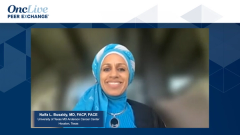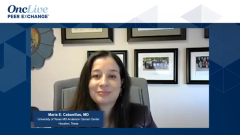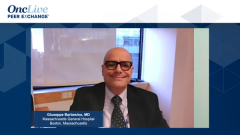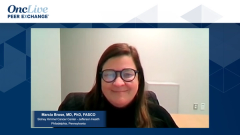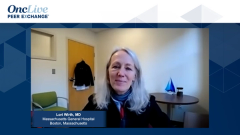
Systemic Therapy Algorithms in DTC
Considerations regarding approaches to sequencing therapies for differentiated thyroid cancer.
Episodes in this series

Lori Wirth, MD: I want to ask you 2 questions, and then I’ll make 1 point. My point is with lenvatinib, the hypertension can kick in really quickly. So, do you have your patients monitor their blood pressure at home?
Marcia Brose, MD, PhD, FASCO: Yes. Sorry, go ahead. What’s the second question?
Lori Wirth, MD: Well, actually, I have 2 more questions. What do you do with a patient with a BRAF V600E mutation who’s progressing and needs systemic therapy? And do you think lenvatinib, sorafenib, whatever, do you think these drugs offer an overall survival benefit? Because with the studies, the SELECT and DECISION trials, both had crossover for the patients who were on placebo, when they had disease progression, they were allowed to cross over and receive the active drug, and the majority of patients received the active drug. So that could negate an overall survival benefit.
Marcia Brose, MD, PhD, FASCO: The crossover definitely makes it harder. There were some initial data in the SELECT trial in the patients over 65 years old that there was an overall survival benefit. What that basically has told me is that the older patients don’t tolerate any progression, and they often can succumb to their disease at the time of their next progression. Whereas the younger patients might be able to manage a little bit of progression and cross over and not have any ill effects toward overall survival. That starts to suggest that there’s an overall survival benefit, and there might be more of an overall survival benefit, but it’s hard to discern because of the crossover. I think we have enough of a suggestion that yes, that is something. I don’t necessarily use that though as a reason to treat everybody once they have a 2-mm nodule because of the toxicity. But I think that the smaller and smaller the disease is when we start it, the difference between the placebo arm and the treatment arm is probably going to come closer together.
As far as the BRAF mutations, the BRAF inhibitors do provide additional activity, which again, I’m sure we’ll go over in the next section. I don’t find that their response rates are as high as what we see with lenvatinib with a 63% response rate, and so I don’t necessarily use a BRAF inhibitor before. But if patients are having a lot of trouble with say the hypertension or toxicities related to the 3 drugs I mentioned, that is certainly a good drug to go to as another option, and regardless, that will be an option at some point in their treatment. So, if they’re having a rough time with the VEGF receptor inhibitors, giving them a break and going to a BRAF inhibitor is absolutely where I probably would use the BRAF inhibitors. I think I forgot what your third question is.
Maria E. Cabanillas, MD: Can I jump in here though really quickly? I think Naifa and I do it a little differently. We actually oftentimes will start with BRAF inhibitors instead of starting with lenvatinib or sorafenib, and that’s because of the different toxicity profile, and sometimes it’s difficult to treat these older patients, especially when they have a lot of comorbidities with the VEGF receptor inhibitors. I can talk later about the BRAF inhibitors and what has been shown in terms of efficacy. But when I think about treating systemically, I’m thinking about that marathon that we’re starting. Yes, I’ll get more partial responses with lenvatinib, but in terms of how long we’re going to have a response or stability, that’s really what’s going on in my mind, how can we get the most out of every single drug. And so, if my patient has lost now 30 lb on a VEGF receptor inhibitor and is debilitated, I may not be able to get them on another therapy. Whereas if I start the other way around, they might be in better shape to start on a VEGF receptor inhibitor later. I’m not saying that’s the right way, that’s just the way that we do it and the way we think about systemic therapy. We’re thinking about the marathon.
Marcia Brose, MD, PhD, FASCO: Do you find that Lori, that you’re less likely to be able to go on to BRAF inhibitor after one of the VEGF receptor inhibitors? How do you do it?
Lori Wirth, MD: I would say, first of all, this is an off-label discussion in terms of using BRAF-directed therapy in the first line. In general, that’s not something that I would definitely advocate, and I usually use a VEGF or a multikinase inhibitor as a first-line therapy, and I generally use lenvatinib as a first-line therapy. I think Maria’s point is well taken, that patients can be on these drugs for 3 or 4 years. The median duration of response is almost 3 years with lenvatinib, and so you have to be able to make sure that a patient stays well throughout that time. It can be challenging. Fortunately, there will be a trial investigating dabrafenib and trametinib in the second- or third-line setting for BRAF mutated iodine-factory DTC [differentiated thyroid cancer]. So, we will have data that I think will be very useful in guiding us in the future.
Naifa L. Busaidy, MD, FACP, FACE: I have one other thing about that. All of you alluded to this, but I just want to point it out. Potentially, one other use for patients who may need BRAF inhibitors depends on the organ involved. So, if you have tumor invading the trachea, or blood vessels wrapped around even the adventitia or the intima, you may want to think about using a drug that has less anti-VEGF activity, just for the potential for fistulas, or carotid bleeds, or what have you. For those patients who have that more advanced disease, you may want to think about using one of those, if it’s a known alteration in the tumor, whether it’s BRAF or NTRK. I know you’re talking about different lines of therapy, but it’s just something to keep in mind, the tumor involved, tumor factors and patient factors. It was already mentioned about hypertension, etc.
Transcript edited for clarity.


